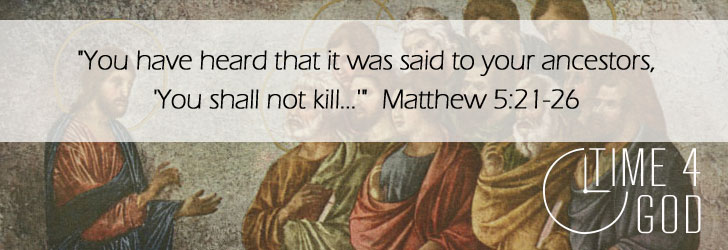If you are anything like me, anger is an all too common issue. I can be awfully quick with an angry word, or insult sometimes. I’ve been known to lose my temper out of frustration with these modern technologies that promised us that they would make our lives simpler and easier. I have lifted my voice in a sudden outburst of angry cursing on occasion and felt a sense of guilt over them almost immediately. Of course, as I’ve grown older, I have learned to recognize the triggers and to control my responses better, but, honestly, I am not free from the occasional angry outburst. That’s why I find this passage always challenging. I have come to see it also as a gift.
Jesus really raises the stakes here in this passage. ʺYou have heard that it was said to your ancestors, ‘You shall not kill; and whoever kills will be liable to judgment.’ But I say to you, whoever is angry with his brother will be liable to judgment.ʺ Woe! This puts anger on a par with killing. If that doesn’t challenge us, nothing will. But we should not only look at this passage from the perspective of judgment. Jesus is trying to get us to see it from another perspective here as well. He says, ʺTherefore, if you bring your gift to the altar, and there recall that your brother has anything against you, leave your gift there at the altar, go first and be reconciled with your brother, and then come and offer your gift.ʺ

This is the response to anger that Jesus wants us to learn. Yes, we do have, and will have, moments of anger within our families, with our friends, or our co-workers. And when we do we have a choice to make. Do we allow the angers to take control of the situation? If we do there is little, or no hope of resolution. Indeed, there is a greater chance that those angers will only grow more intense. There is a kind of anger that is even more dangerous; the anger called resentment. Resentment is unresolved anger that boils at a low temperature until something triggers it. Then it explodes in a thoughtless violence of words, or worse. It is always destructive and can even be murderous.
How do we prevent such anger? Jesus tells us here that before we allow our angers to turn into resentments, we need to learn to go to those we are angry with, or to those who are angry with us, and talk with them, try to find the means through which we might find reasons for reconciliation. There is nothing more precious than our relationships with one another. That is why when we are injured by another, or vice versa, when we injure another, nothing is more devastating to us. If we truly treasure relationships then we have to learn to see the other as more important, more valuable to us, than the issue that separates us. We have to be able to love them, despite our angers with them. In fact, we have to love them enough to forgive them, or, when necessary, to ask them to forgive us. If forgiveness does not come, even after sincere attempts are made, then we have to love ourselves, and them, enough to let them go and, with the grace of God, find a way not only to still forgive, but also to forget.

In the end, it does not take much insight to see that love is empowering, liberating, and life-giving, both for myself and the ʺoffending partyʺ. Nor does it take much to see that anger is dangerous, and can even be deadly to the body and to the soul, both our own and that of the other with whom we are angry. Jesus calls us always to life. Let us pray for the grace to turn away from our angers and toward the love that Christ calls us to. When we do, we will find what we really desire—happiness.
SKM: below-content placeholderWhizzco for FHB

